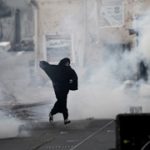Earlier this week, South Korea agreed to halt the sale of tear gas to Bahrain following mounting pressure from the Stop the Shipment campaign and human rights organizations. South Korea’s refusal to supply the country with additional tear gas makes a strong statement of support for human rights and other countries should follow its example. Currently, however, Bahrain is able to replenish its supply of chemical agents through a number of other countries, including Germany and South Africa. Moreover, the violations that Bahrainis experienced during the anti-government uprising that began nearly three years ago continue to this day.
In 2012, I was part of a team for Physicians for Human Rights (PHR) that documented the Bahraini government’s use of tear gas as a weapon, as well as the long-term health effects caused by such misuse. Bahraini police and security forces purposely discharged tear gas canisters at close range during the peaceful civilian uprising that began in February 2011, aiming at the heads of both children and adults, and shot canisters directly into homes and other enclosed spaces. Government forces also used rubber bullets, pellet guns, bird shot, and even live ammunition against its citizens. Those injured were afraid to seek formal medical assistance for fear of being detained. Of the thousands of people who have been arrested, some have been tortured or experienced other ill-treatment in detention, while others have died in custody.
Health professionals and medical facilities were not spared from such attacks. Instead, they were deliberately targeted by the government. The military occupied the Salmaniya Medical Complex, Bahrain’s largest public hospital, and the country’s security forces attacked specific health professionals. Doctors told me they were pulled out of their surgical suites and arrested while operating on patients. Ambulance drivers were blocked from taking injured protesters to the Salmaniya hospital, forcing patients to go to local hospitals that were not necessarily equipped to treat their injuries.
Bahraini citizens are still being denied their rights, as government forces continue to violently crack down on protesters and engage in arbitrary arrest, torture, and disappearances. Almost 100 people have been killed since the protests began, while another 2,500 people are believed to be imprisoned. In addition, the Bahraini forces have attacked, imprisoned, and tortured doctors, nurses, and other members of the medical community who came to the aid of wounded demonstrators. PHR is particularly concerned about the continued imprisonment of three medics who recently sent a letter from the Jaw prison. The handwritten letter highlights the poor and cramped conditions and urged “all the medics all over the world especially those at the zones of conflict to abide to and hold tight on the noble ethics and principles of medical neutrality,” an international standard that requires governments to not interfere with the functioning of health services during times of conflict or unrest. I was so deeply moved by their letter – their courage, their conviction, and their leadership even while imprisoned. These medics – and the cause they stand for – deserve our utmost respect and unyielding support.
While South Korea’s decision to stop shipments of tear gas is a success to celebrate, we must continue to fight for Bahraini rights and an end to all shipments of toxic chemical agents to Bahrain. We continue to support the Stop the Shipment campaign in order to stop shipments of tear gas from Germany, South Africa, and other countries, and we urge our supporters to do so as well.

